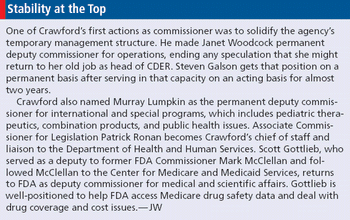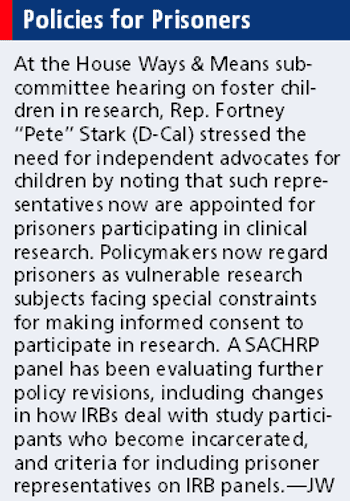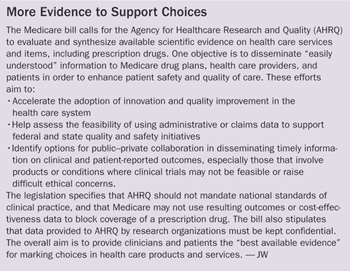
Curbs on consulting and financial interests aim to restore researchers' credibility.
Jill Wechsler is ACT's Washington Correspondent

Curbs on consulting and financial interests aim to restore researchers' credibility.

Commissioner Crawford's challenge is to restore public confidence in drug safety and approvals.

Recent events highlight the need to clarify rules and policies for pediatric studies.

Regulators and researchers seek to curb the overload on IRBs and harmonize AER policies.

Clinical trials may take longer and become larger as proposals emerge to strengthen regulatory policies.

New policies aim to simplify testing for single-pill combos and products that combine drugs with medical devices.

Concerns over risky medicines are shutting down clinical studies and boosting demand for comparative drug analysis.

Inadequate pre-approval testing and information disclosure may slow new drug development and change regulations.

The Medicare drug benefit and FDA's Critical Path Initiative will push and pull new drug development.

FDA eyes new approaches to testing drugs for children and adults, and clarifies electronic data policies for clinical trials.

Sponsors react to pressure to register ongoing clinical trials and to provide access to drug studies.

FDA encourages clinical data e-submission and boosting development of new therapies to combat bioterrorism, cancer, and obesity.

New standards and research methods aim to provide more useful information on population subgroups.

FDA and NIH investigate staff relationships with industry to eliminate any outside influence on regulatory decisions and clinical trial procedures.

Federal agencies seek to curb redundant IRB procedures and encourage voluntary accreditation of research organizations.

New technologies and research methods aim to reduce study failures and spur drug development.

McClellan shifts to head Medicare after delivering new proposals to block counterfeits, add bar codes, and assess drug imports.

Policymakers want to harmonize for safety reporting, IRB operations, patient access, and other areas to spur product development.

FDA eyes e-data submissions to improve regulatory oversight and ensure appropriate and safe drug use.

After a long, contentious battle, Republicans mustered up enough votes just before Thanksgiving to approve a massive, complex bill designed to overhaul Medicare policies and provide coverage for prescription drugs.

This past year has been one of tremendous activity at the Food and Drug Administration, and at other government agencies involved with healthcare, biomedical research, and national security.

These names, numbers, and titles are a phone directory for the regulatory world.

New initiatives would form networks and harmonize standards to translate basic research into needed treatments.

FDA plans to rewrite rules governing electronic records while offering new policies to encourage risk-based regulatory approaches to application review and inspections.

FDA plans to rewrite rules governing electronic records while offering new policies to encourage risk-based regulatory approaches to application review and inspections.

FDA is exploring policies to incorporate genomic information into the regulatory process.

HHS offers IRBs, institutions, and investigators points to consider when dealing with financial relationships and conflicts of interest in clinical research.

FDA is revising its policies that govern electronic recordkeeping, clarifying standards for measuring subject outcomes, and seeking to encourage pediatric studies.

The HIPAA privacy policy limits the use of protected health information to that required or permitted by regulations.

Sponsors tackle international research challenges to develop AIDS, malaria, and TB therapies for developing nations.